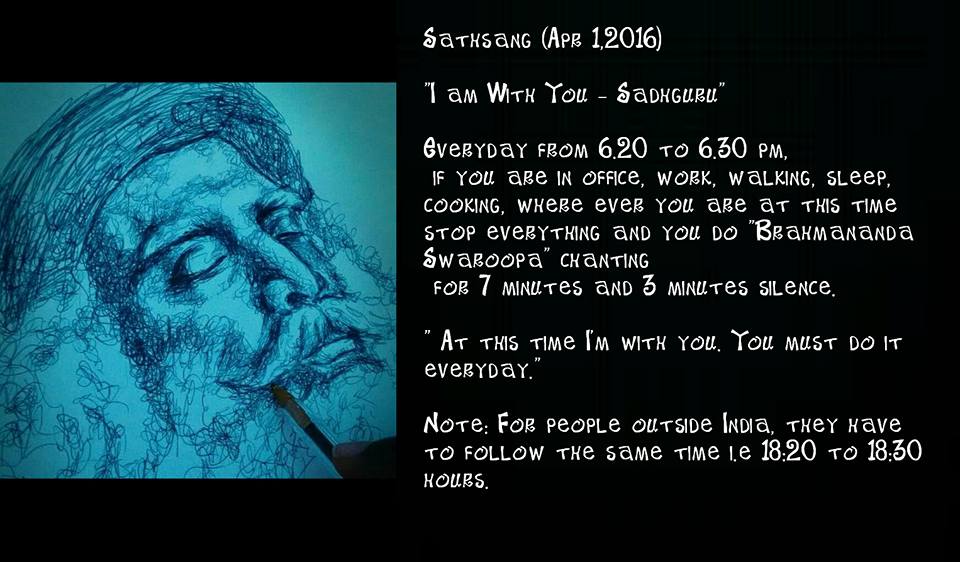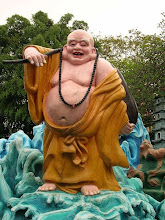Subscribe to:
Post Comments (Atom)
skip to main |
skip to sidebar

Darshan - To Behold, what is highest in your life
This blog is expression of joy, of being in love with Sadhguru. Please Check www.ishafoundation.org for details. Enjoy the Spiritual Music Jukebox with over 200+ musicals. My email id : Fidarose.isha@gmail.com. Suggestions and Feedbacks are Welcome.
Featured Post
Sadhguru's message to us
Sathsang (Apr 1,2016) "I am With You - Sadhguru" Everyday from 6.20 to 6.30 pm, if you are in office, work, walking, sleep...
Classical form of Hatha Yoga
Isha's Jukebox
190+ Spiritual Jukebox
DNA of Successful Business Leadership
Mantras from Vairagya
Shivanga Sadhana
Learn Free Isha Kriya Online
Isha Sacred Walks
Translate
Donate at Giveisha.org
Fellow travellers in love with Sadhguru
Blog Archive
-
▼
2011
(751)
-
▼
July
(97)
- Tehelka Magazine's Editor experience of doing the ...
- Osho on "The Book of Mirdad"
- The funniest joke, I have ever heard, from the rea...
- Obsession : A Radical Islam's War against the West...
- Q: Is there any benefit to fasting? Sadhguru Enlig...
- Here, We shudder, at the thought of encountering s...
- The Speeeeeeeeeeding Guru - Tehelka Magazine's Edi...
- The Rising Kundalini - Nice Music
- Tribute to Papaji. A Disciple of Ramana Maharishi...
- ISHA Patanjali Satkam.wmv
- Searching for fulfillment ? Sadhguru answers.
- The mark of a Real Sannyasin - Osho
- Awesome Daughter and Father Duet
- Radha Krishna Lullaby
- Questioner: My son is unable to cope with the deat...
- The ever Irresistible Unconcious Desire of Men, to...
- Of Life And Love: Rumi Poetry (pt.2)
- A Meditator will become, more and more, Sensitive ...
- Shiva Shiva Shiva - Gundecha Brothers Dhrupad
- What is the meaning of "Yogaratova Bogaratova"? Sa...
- The Path of the Mystic - Osho Music
- Mahabharat -- Saga Nonpareil 11-18 February, 2012
- Why Husband hate Wife
- Sadhguru and Sri Sri Ravishankar meets
- Emotional Music Indians Touch - Lost Lands Forever...
- Tribute to Sri Anandamayi Ma
- Tantra Yoga - Being an Instrument of Life - Sadhguru
- Osho on Meditation and its effect on our Relations...
- Reaching out to Somalia - An Issue needing our urg...
- What Isha Yoga has done to me ? An Isha Meditator...
- Mother-in-law wants daughter-in-law to change, Dau...
- how mothers deliver a baby from little girl point ...
- Yanni - Vilon Blanc - A music video
- Poor Man. This is how all the Women of the world,...
- Jai Shiva Shankara - A Music Video
- Don't try to fix the Garbage Bin - Sadhguru
- Krishna Kanha..Mukunda Manohara - Shree Krishna
- The reality of India
- This Video blames the Indian Ministers for inactio...
- A Beautiful feeling of Oneness
- No need for any Meditations or Yoga. I have decid...
- Just a few days ago one young man said to me, “I a...
- Solitude _ Buddha Bar
- ♥A Day With You By Omar Akram♥ -A Music Video
- Is There Such a Thing as a Soul Mate? Sadhguru ans...
- Shivastotram - Sounds of Isha
- THE MIRACLE WATER VILLAGE - A boon to the struggli...
- Osho on Rabindramath Tagore
- The people who fit in the world are people who hav...
- Hey!!!!!!! It works.
- Sometimes Life turns up, contrary to our expectations
- osho - never born never died - A Music Video
- I say that the Buddha is in you already - Osho
- If these animals, who are born enemies, can go on ...
- OSHO: Live your Life - Don't Just Watch It on TV.
- Mea Culpa - A Music Video from Enigma
- Arabic Music (very soothing) By Lena Chamamian , T...
- Timeless Quotes from The Buddha
- spirit trance kali shiva krishna baul sufi peace l...
- Mountain Hare Krishna by Krishna Das and Sting - A...
- Why People Explode When They See You? Sadhguru
- Being together is the beginning, Working together ...
- Men are Men
- Dedicated to Sadhguru on the Auspicious occasion o...
- Master - The Greatest Mystery - A Documentary Film
- Not succumbing to the pressures of the society
- Pandit Jasraj - Bhajan
- Mritasanjeevani Stotra
- Shiva Suvarnamala Stuti - I love this
- Suvarnamala Stuti - Pandit Jasraj 1/2
- That is what has happened to the human mind
- Are you Guilty ?
- A Perfect Zen Movie on the Master Dogen
- Removing toxins from your body with a little boile...
- Working playfully
- A musician can just find anything, if he really wa...
- A very sweet music video on how Sadhguru is leadin...
- The auspicious occasion of Guru Pournami will be c...
- yanni - playing by heart
- If I Could Tell You - Yanni Live! The Concert Even...
- When Jesus said Love thy neighbour, it does not me...
- Awareness, The Inseparable part of our daily pract...
- Nothing wrong in eating a Non-Vegetarian Food. Bu...
- Questioner : You spoke on the no-problem, the non-...
- "Hug for the World" - A Music Video
- The Spirit of Rebellion - Osho
- Surprised Kitty (Original)
- “What women SAY and what they really mean… - A Sha...
- Krishnamurti - The Real Revolution - Part 1 of 2
- Sadhguru @ TED - Part I
- Dialogue on Relationship between a Teacher and the...
- OSHO ... sexuality, sex, love and compassion.
- Age is no bar. Hearts can be broken at any age.
- Nightingale - Yanni (Tribute) [1997]
- The Multi-Religious Shrine - Dhyanalinga Yogic Tem...
- Sadhguru Jaggi Vasudev
- She's Alive... Beautiful... Finite... Hurting... W...
-
▼
July
(97)
Websites that will make your day
- Learn Free Isha Kriya Online
- Inner Engineering Program Online
- The official Isha Yoga Blog
- www.IshaYoga.org
- Dhyanalinga - The Temple of the divine
- Isha Yoga Centre Virtual Tour
- Osho's Audio Discources
- Free Osho Books PDF Format
- Laughter - A medicine to cure illness
- Donate to Isha Foundation
- Isha's Project Greenhands
- Isha's Rural Rejuvenation Project
- Isha Vidhya School
EBooks I Love - Free Ebooks available
- http://www.happinessofbeing.com/The_Path_of_Sri_Ramana_Part_One.pdf
- http://www.happinessofbeing.com/The_Path_of_Sri_Ramana_Part_Two.pdf
- Bhaj Govindam by Osho
- Matri Vani - Anandmayi Ma
- At the Feet of the Master - J.Krishnamurthi
- Isha Yoga Booklet
- Life sketch of Malladihalli Swami - Sadhguru's Guru
- Glimpses of the Golden Childhood - Osho.
- An Intense Love Story of a Seeker for his Master Osho.
- Aghora, at the left hand of God - Robert.E.Svoboda
Books I Love
Labels
- Action for Rural Rejuvenation - Isha Project (3)
- Amma (1)
- Anandamayi Ma (1)
- Android Apps from Isha (6)
- awareness of death awakens love (8)
- awareness the inseparable part of meditation (3)
- Bhava Spandana Program (3)
- Biotechnology (1)
- Books not to be missed (2)
- caller tunes of isha yoga (1)
- Cartoons and Fun (10)
- Childrens dying of Hunger (3)
- CHINESE AGGRESSION AGAINST INNOCENT TIBETANS (8)
- Conversation with Celebrities (19)
- dhyanalinga (8)
- Donate for Sadhguru's Project (5)
- Dowsing is fun (1)
- Drug Addiction (1)
- Eckhart Tolle (1)
- Events every year (4)
- faith in the guru (19)
- Funny Videos (64)
- Gurdjieff (1)
- Guru Puja (6)
- health topics (26)
- Helpless School Childrens (6)
- INDIA AGAINST CORRUPTION - ANNA HAZARE (75)
- Inner Engineering Online (2)
- Innocent Muslims of the World (1)
- Inspiring words (29)
- Isha effect on my life (17)
- isha home school (6)
- Isha Life Fitness Centre cum Restaurant (2)
- Isha Meditators experiences with Isha (8)
- Isha Nature Awareness Program for Children (1)
- Isha Vidhya (4)
- Jiddu Krishnamurthi (8)
- linga bhairavi (15)
- Mantras from Vairagya Album (8)
- miscellaneous spiritual articles (24)
- Mooji (21)
- Music I Love (3)
- My love Osho (145)
- Neglected Old People (1)
- Nisargadatta Maharaj (1)
- No-mind discourse from Papaji (11)
- Nothing wrong in eating a Non-Vegetarian Food. Do you know why ? (3)
- Obstacles in the path (4)
- Other spirtual masters (81)
- Paramahansa Yogananda (31)
- parenting our child (6)
- People nearing death now ? (7)
- People to remember (3)
- Performing worldly duties (4)
- Practice - a joyful experience (5)
- Problems we created - Population Explosion (7)
- ramana maharishi (78)
- real life stories (3)
- reason and intuition (2)
- Robert Adams (13)
- rudraksha (1)
- Sadhguru Chants (3)
- Sadhguru in Hindi (2)
- Sadhguru on Jainism (1)
- Sadhguru Sannidhi Pada Yantra (1)
- Sadhguru Videos (358)
- Sadhguru's daughter Radhe (1)
- Sadhguru's Mega Programs (1)
- Sadhguru's Punchlines (1)
- Sadhguru's take on HIV AIDS (1)
- sannidhi - 90 days retreat for hardcore seekers (1)
- sannyas (13)
- Sathsang with Sadhguru (3)
- Satyamev Jayate (14)
- Save planet (13)
- Selective movie reviews (2)
- sex (7)
- Shivanga (1)
- SILENCE (6)
- Sitting at Master's feet (3)
- Snakes (1)
- Songs of Sadhguru (10)
- Songs on Osho (6)
- sound of isha (21)
- south indian actress (1)
- Southern India Mystics (2)
- SPIRITUAL MOVIES COLLECTION (10)
- SPIRITUAL MUSIC. (255)
- Spiritual Places of Importance (20)
- Suffering cold - Obstacle to effective pranayama (1)
- Swami sukhabodhananda (4)
- Talented Artists (4)
- The Naughty Side of Sadhguru (2)
- The Spirit of Rebellion (6)
- The way of the Boddhisattva (3)
- Tribute to Other Spiritual Masters (4)
- Trip to Velliangiri Mountains (1)
- understanding cockroaches (1)
- VIDEOS WITH THE MESSAGE (68)
- volunteering in isha (9)
- Women's who inspire (4)
About Me
Subscribe via email
Search This Blog
Sitting in Sadhguru's Presence

Darshan - To Behold, what is highest in your life
"Sadhguru - More than a Life" - A biography of Sadhguru's Life by Arundhathi Subramaniam
Blogger's Note
One thing that is important to note here is that, whatever I may write about Isha Yoga, it is always about my perspective of Isha Yoga and limited. It can never give a complete view of Isha Yoga. To know about Isha Yoga is infinite.




























No comments:
Post a Comment